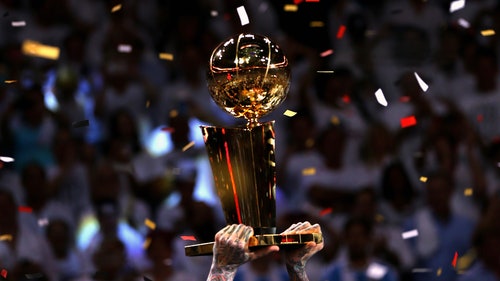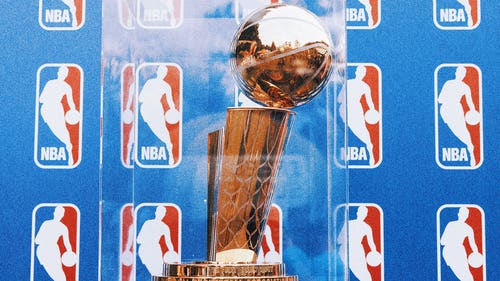
What Toronto Raptors coach Nick Nurse's squatting says about his success in the NBA
By Yaron Weitzman
FOX Sports NBA Writer
When NBA veteran Danny Green was traded to the Toronto Raptors in the summer of 2018, he didn’t know much about his new coach. And for good reason.
Nick Nurse was far from a household name. He wasn’t much of an NBA name, either. His path to the league had included stops in Britain and Iowa. He’d strutted the sidelines of fictional-sounding professional teams such as the Birmingham Bullets and Manchester Giants.
But it didn’t take long for Green to notice that Nurse was different from other coaches. And not just because he carried a guitar on road trips or occasionally had his defense utilize a grade-school-style scheme.
"He was always squatting on the sidelines," Green recalled recently. "He’d be down there for a while, too. It was actually impressive."
If you’ve watched the Raptors, you have no doubt noticed Nurse assuming this position. It doesn’t matter if his team is on offense or defense, flying up the court or standing around waiting for a free throw. It doesn’t matter if Nurse is wearing a suit or sweats. It doesn’t matter if it’s the first moments of a lifeless November tilt or the final seconds of an exhilarating Game 7.

Where was Nick Nurse when Kawhi Leonard hit the shot against the 76ers to win Game 7 of the 2019 Eastern Conference semis? Squatting to Leonard's left, naturally. (Photo by David Dow/NBAE via Getty Images)
"He’s squatted as long as I can remember," said Minnesota Timberwolves coach Chris Finch, a longtime friend of Nurse’s dating to the mid-1990s, when they coached against each other in the British Basketball League. "You’ll see that from college coaches. But you don’t see that from anyone else in the NBA."
During a recent Raptors win over the New York Knicks, for example, Nurse did 33 squats for a total of nine minutes, 12 seconds (I counted from my press seat). He spent more than 7% of the game’s two-hour, five-minute run time in a squat. Twenty-four of his squats came in the first half, when the Raptors struggled and trailed. Nurse squatted during out-of-bounds plays. He squatted during jump balls. He squatted during fast breaks. In the fourth quarter, he held one squat for 68 seconds.

"I built up a little strength catching. I was a backup catcher in Little League," Nurse told me that morning.
I also asked him why he squats. He paused. "Ah, geez, I don't know. I would imagine it started a long time ago," he said. "Mostly, I think I'm doing it to try to get out of the fans’ way, or whoever's trying to watch."
Although it sounds a little silly, that response might actually explain Nurse's success. He wasn’t a coach who was fast-tracked to stardom. He arrived there only after spending years toiling away in outposts where duties such as customer service fell under his purview. How does a longtime G league coach whose professional playing career was limited to a single season as a player-coach in the British Basketball League become one of the NBA’s most respected head tacticians?
Look no further than the squat.
Nurse’s coaching career began in 1989 as a student assistant at Northern Iowa, where as a player he set a school record for 3-point accuracy. After that, he joined the British Basketball League’s Derby Storm, with whom he served as a player-coach. He then returned to Iowa to take the head job at Grand View University, a tiny, Des Moines-based school. It was there that Nurse began his squatting routine.
"The image I have of him on the sidelines at Grand View is in a squat," said David Nurse, Nick’s nephew and a longtime performance coach.
Nurse spent two seasons at Grand View and two as an assistant at South Dakota before returning to Europe, where he stayed for 11 years. He won two titles and was named BBL Coach of the Year twice. While there, he was also charged with such tasks as increasing attendance. He once tried boosting ticket sales for his Brighton Bears by signing a 44-year-old Dennis Rodman to a one-game contract.
In 2007, Nurse was able to return home, but only after enlisting a local lawyer and Democratic Party bigwig named Jerry Crawford to help him convince the NBA to add an expansion Development League in Iowa. "He had to create a team in order to coach," Crawford once told me.
Nurse didn’t stop there. He helped choose the team name, provided input on the team’s logo and uniforms, and even sold tickets.
"When he formed the Iowa Energy, a lot of locals didn’t think professional basketball could last here," said Tommy Birch, a longtime sportswriter for the Des Moines Register. He recalled seeing Nurse interacting with fans seated courtside during games, often from a squat.
"Nick understood how important it was for him to serve the fans any way he could," Birch said.
Meanwhile, Nurse was filling his notebooks with all sorts of concepts and schemes that he was picking up along the way. At South Dakota, he put together a 31-page manual on shooting. In Europe, he’d jot down notes while watching soccer. At every stop, he’d pepper colleagues with questions about their systems — and then apply what he learned.
"I think if you come up the way he did, you need to learn how to think outside the box," David Nurse said. "Nick did that, and you can see it in his coaching."

If Drake wants to talk to the coach of his favorite team, where does he find him? Squatting on the sideline, of course. (Photo by Vaughn Ridley/Getty Images)
Nurse’s big break came in 2013, when, after six years in the D League, the Raptors hired him as an assistant to head coach Dwane Casey. His role soon grew.
Within a few years, he was handed the reins to the offense and tasked with modernizing and revamping the team’s attack. He pushed his players to launch more from deep and used training camp gimmicks, such as having 3s from the corners count for four points, to drill in the idea.
Then, in the summer of 2018, after another disappointing playoff exit, the Raptors fired Casey and gave Nurse his job. The team traded for Kawhi Leonard a month after that.
Cut to June 2019, and Nurse was hoisting a championship trophy. Leonard was the catalyst for the title run, but Nurse’s deep playbook and willingness to experiment — during the Finals, he unleashed a box-and-one against the Golden State Warriors and Steph Curry — played a huge role.
"He was the perfect guy for the job," said Green, a member of that championship team.
With Leonard now in Los Angeles — and his former backcourt partner, Kyle Lowry, running the point for the Miami Heat — Nurse's job has changed. The future is now the focus for the Raptors, who, after missing the playoffs last year, have begun this season 7-6, even with All-Star Pascal Siakam missing 11 games due to a shoulder injury.
Nurse, as always, has adjusted his playbook. His rotation is full of rookies and second-year players. The offense is relying on midrange jumpers.
Yet his approach remains the same.
"We see him squatting all the time," Raptors forward OG Anunoby said. "We don’t even talk about it anymore."
Yaron Weitzman is an NBA writer for FOX Sports and the author of "Tanking to the Top: The Philadelphia 76ers and the Most Audacious Process in the History of Professional Sports." Follow him on Twitter @YaronWeitzman.















































































































































